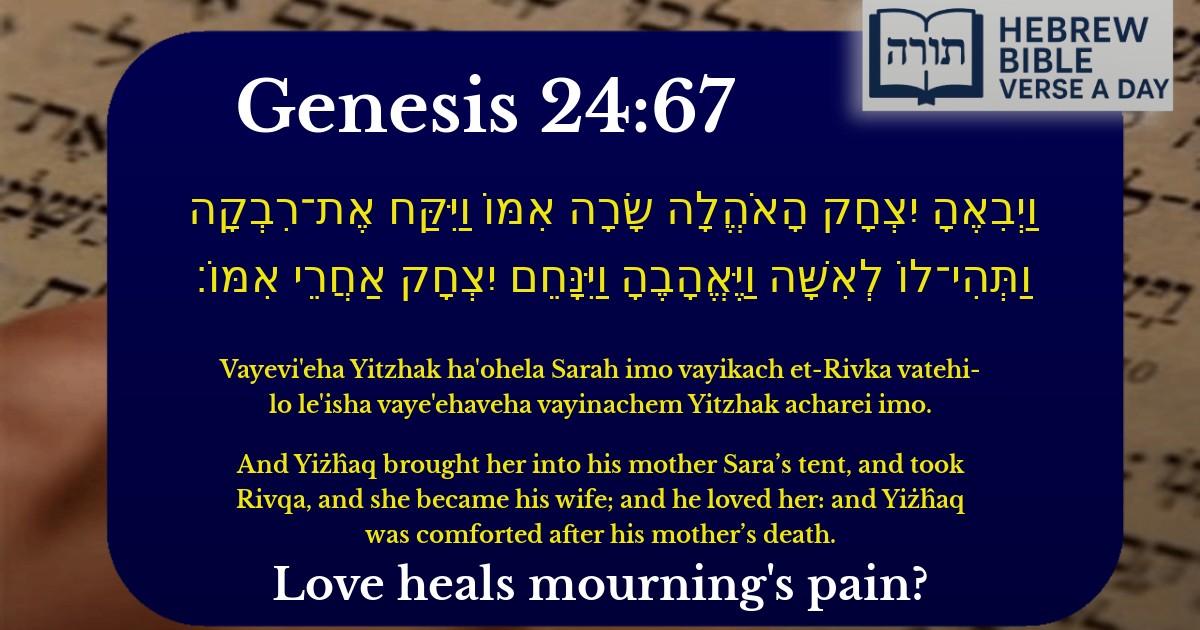Join Our Newsletter To Be Informed When New Videos Are Posted
Join the thousands of fellow Studends who rely on our videos to learn how to read the bible in Hebrew for free!
Hebrew Text
וַיְבִאֶהָ יִצְחָק הָאֹהֱלָה שָׂרָה אִמּוֹ וַיִּקַּח אֶת־רִבְקָה וַתְּהִי־לוֹ לְאִשָּׁה וַיֶּאֱהָבֶהָ וַיִּנָּחֵם יִצְחָק אַחֲרֵי אִמּוֹ׃
English Translation
And Yiżĥaq brought her into his mother Sara’s tent, and took Rivqa, and she became his wife; and he loved her: and Yiżĥaq was comforted after his mother’s death.
Transliteration
Vayevi'eha Yitzhak ha'ohela Sarah imo vayikach et-Rivka vatehi-lo le'isha vaye'ehaveha vayinachem Yitzhak acharei imo.
Hebrew Leining Text
וַיְבִאֶ֣הָ יִצְחָ֗ק הָאֹ֙הֱלָה֙ שָׂרָ֣ה אִמּ֔וֹ וַיִּקַּ֧ח אֶת־רִבְקָ֛ה וַתְּהִי־ל֥וֹ לְאִשָּׁ֖ה וַיֶּאֱהָבֶ֑הָ וַיִּנָּחֵ֥ם יִצְחָ֖ק אַחֲרֵ֥י אִמּֽוֹ׃ <span class="mam-spi-pe">{פ}</span><br>
וַיְבִאֶ֣הָ יִצְחָ֗ק הָאֹ֙הֱלָה֙ שָׂרָ֣ה אִמּ֔וֹ וַיִּקַּ֧ח אֶת־רִבְקָ֛ה וַתְּהִי־ל֥וֹ לְאִשָּׁ֖ה וַיֶּאֱהָבֶ֑הָ וַיִּנָּחֵ֥ם יִצְחָ֖ק אַחֲרֵ֥י אִמּֽוֹ׃ {פ}
🎵 Listen to leining
Parasha Commentary
📚 Talmud Citations
This verse is quoted in the Talmud.
📖 Yevamot 61b
The verse is referenced in a discussion about the nature of marriage and the relationship between Isaac and Rebecca, illustrating how Isaac was comforted after his mother's death through his marriage to Rebecca.
📖 Bava Batra 16b
The verse is cited in a discussion about the virtues of Sarah and how her tent was a place of blessing, which was restored when Rebecca entered it.


Isaac's Marriage to Rebecca
The verse (Bereshit 24:67) describes Isaac bringing Rebecca into his mother Sarah’s tent, marrying her, loving her, and finding comfort after his mother’s death. This passage holds deep significance in Jewish tradition, as it marks the continuation of the Abrahamic covenant through Isaac and Rebecca.
Entering Sarah’s Tent
Rashi explains that when Isaac brought Rebecca into Sarah’s tent, three miracles that had ceased with Sarah’s death returned:
- The Shabbat candles remained lit from one week to the next.
- A blessing was present in the dough (the challah remained plentiful).
- The Divine Presence (Shekhinah) rested over the tent.
These miracles demonstrated that Rebecca was a worthy successor to Sarah in righteousness (Rashi on Bereshit 24:67, citing Midrash Bereshit Rabbah 60:16).Isaac’s Love for Rebecca
The Torah states that Isaac loved Rebecca, which Ramban (Nachmanides) explains as a natural progression of their sacred bond. Unlike Abraham and Sarah, whose marriage preceded their spiritual mission, Isaac and Rebecca’s union was forged with divine providence (through Eliezer’s prayer and the sign at the well). Their love was not merely emotional but rooted in shared devotion to God’s will (Ramban on Bereshit 24:67).
Comfort After Sarah’s Death
The Talmud (Bava Batra 16b) teaches that mourning for a righteous parent is profound, and true comfort only comes through the continuity of their legacy. Isaac was comforted after Sarah’s death because Rebecca emulated Sarah’s virtues, ensuring the spiritual and physical sustenance of the household (Midrash Tanchuma, Chayei Sarah 4). The Sforno adds that Isaac’s consolation came from seeing God’s promise fulfilled—the next generation of the covenant secured through Rebecca.
The Symbolism of the Tent
The tent represents the Jewish home, a microcosm of holiness. Sarah’s tent was a place of divine connection, and Rebecca’s entry signifies the transmission of this sacred role. The Kli Yakar emphasizes that just as Sarah was the foundation of the first matriarchal lineage, Rebecca now assumed that role, ensuring the future of the Jewish people through her marriage to Isaac.